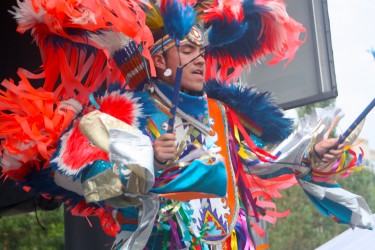Article Origin
Volume
Issue
Year
For residential school survivor Larry Loyie, Premier Rachel Notley’s apology means nothing if “it’s just a ceremony or a frilly thing.” It needs to be followed by action.
On June 22, Notley became the first premier to formally apologize to those who attended residential schools.
“As our first step, we want the First Nation, Métis and Inuit people of Alberta to know that we deeply regret the profound harm and damage that occurred to generations of children forced to attend residential schools. Although the Province of Alberta did not establish this system, members of this Chamber did not take a stand against it. For this silence, we apologize,” she said in a ministerial statement during session at the Alberta Legislature.
Notley went on to acknowledge the damage caused by forced residential school attendance – the loss of community, language and culture – and the intergenerational impact that has led to poverty, neglect, drug addiction, mental health issues, and “great despair.”
She said, “True reconciliation will only be achieved if we as governments and citizens are willing to make a fundamental shift in our relationship with the First Nations, Métis and Inuit peoples of Alberta.”
Loyie wants to know what this “fundamental shift” will look like.
“(The apology) means nothing to me if it’s coming from a person I don’t know, a politician, who thinks she’s doing something good and in fact is not doing anything good if she doesn’t move on something that could rectify what we, as children, went through,” he said.
Loyie was forced out of public school in Slave Lake at the age of nine and into St. Bernard residential school in Grouard where he stayed for six years. He travelled home for summers unlike many of his school mates. Loyie was one of seven siblings from his family to reside at St. Bernard and was not allowed to speak Cree or talk to his four sisters. He spent his days piling wood and picking potatoes.
Loyie tells his story, and those of other survivors, in Residential Schools: Words and Images of Survivors, which he co-wrote with his partner Constance Brissenden. The book includes a passage from Eddie Smith, who arrived at Edmonton Indian residential school in 1931. Smith worked the 346-hectare United Church school farm. He had someone write a letter to his parents: “I just went to school three days since I came here, this isn’t why my father send me here to work, he send me here to go to school and study hard to learn to read and write.”
“Even though Larry’s been looking at himself in (a) residential school relationship and also over 25 years of intense research, it’s still a very emotional and passionate subject for him,” said Brissenden.
There were 25 Indian residential schools in Alberta. The Truth and Reconciliation Commission has identified 12,000 survivors in the province.
Loyie wants to see Notley’s words of apology followed by actions taken to “promote the healing process.” Providing successful educational opportunities for the province’s young Aboriginal population is key, he says, as is educating today’s students about Indian residential schools.
Treaty 8 Grand Chief and Mikisew Cree Chief Steve Courtoreille says that in discussions with new Aboriginal Affairs Minister Kathleen Ganley, Chiefs have made it clear that there are a wide range of issues that Alberta needs to step up to the plate on and not ignore because of jurisdictional conflicts.
“When it comes to children in care, education, housing, anything to do with First Nations, we should all be treated alike and work together. (Ganley) agreed this would be the way they want to work with us,” he said.
Courtoreille sees Notley’s apology as recognizing Aboriginal people in the province and the first step in improving relations.
“This tells me that this government really wants to do things right the first time around. Things will get better throughout our relationship with the newly-formed government,” he said.
Notley also put her support behind the call for a national inquiry into missing and murdered Aboriginal women, saying that “harsh realities” such as poverty, racism and lack of education had to be addressed in order to tackle the issue.
“The Alberta government will develop a renewed relationship with Aboriginal peoples, based on trust and respect and take true action on these root causes, once and for all. Because we understand that true reconciliation is a matter of action, not just words,” she said.
Courtoreille was not surprised by Notley’s statement, noting that her campaign platform included a commitment to Aboriginal peoples, something she also addressed in her victory speech election night.
Photo Caption: Celebrating Aboriginal peoples - National Aboriginal Day was marked June 16 at Canada Place in Edmonton with a number of activities. In some cities across the province, National Aboriginal Day was commemorated with a week of activities.
- 1585 views

